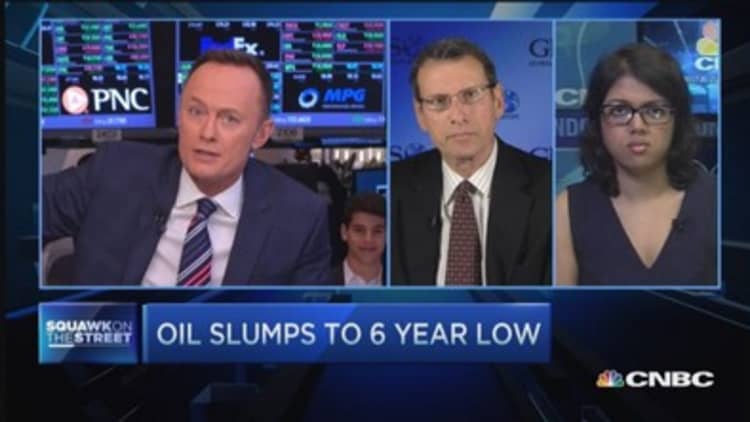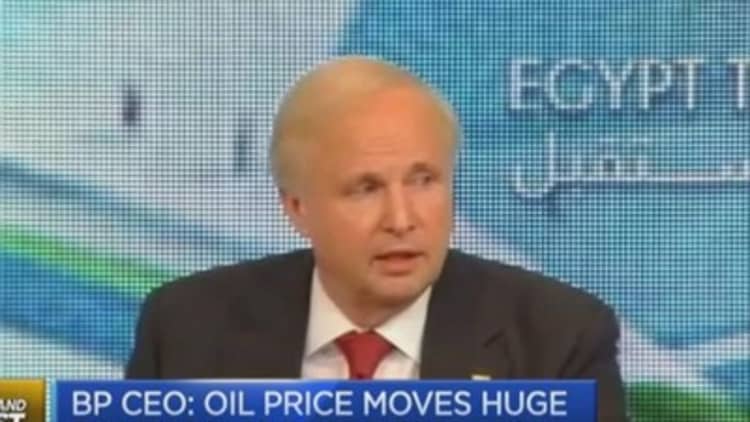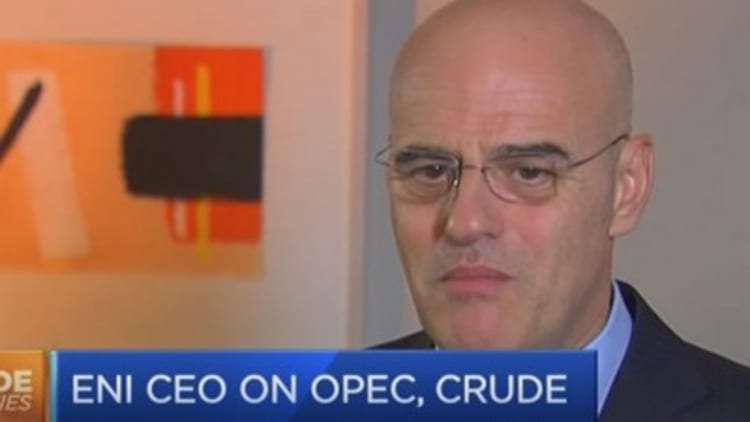
Deal-making in the energy patch remains largely frozen as drillers wait for crude to hit bottom, but signs of a thaw are emerging.
Exploration and production firms have issued nearly $9 billion in stock this year, well above recent first-quarter totals. Some industry watchers see that as a precursor to increased mergers and acquisitions activity, as potential takeover targets and asset holders consider previously unacceptable prices.
Equity issuances ground to a halt after OPEC's Nov. 27 meeting, when the cartel said it would not decrease oil output. At the time, the announcement accelerated oil's fall, sending the cost of benchmark Brent crude spiraling down 40 percent to a closing low on Jan. 13.
Read MoreChina and Middle East will drive oil demand: OPEC
December was the only month in 2014 during which no publicly traded "upstream" oil companies—explorers and drillers—issued new shares, said Dean Burke, vice president in capital markets at Tudor Pickering Holt, an energy investment and merchant bank.
That trend has reversed sharply since Southwestern Energy broke the stalemate on Jan. 14, with a $690 million offering, after closing its purchase of $5 billion in assets from Chesapeake Energy. Since then, upstream oil companies have issued $8.8 billion in equity, according to data provided by Tudor Pickering Holt. That is more than double the capital raised through equity in the first quarter of 2014.
Virtually all the sales this year have taken place on an overnight basis, many through so-called bought deals, in which banks buy the stock directly from the company and immediately remarket it. In such deals, firms know exactly how much capital they will raise, rather than letting the open market decide.
Companies typically opt to issue stock overnight in volatile and uncertain markets, said Burke. "Companies are less inclined to take risk. They want to get capital in the door."
Read MoreEni becomes first oil major to cut dividend; shares fall
Those equity sales show that energy firms are beginning to accept that any rise out of today's low oil price environment will not be quick and steep, but long and relatively flat, said Jim Rice, co-managing partner at the Houston law office of Sidley Austin, a firm that specializes in international business law.
As a result, the spread between bids and asks—the maximum price buyers are willing to pay and the minimum sellers are willing to accept—should begin to narrow, he said. The prices that drillers may have turned down 90 days ago are now looking more reasonable, he added.
"The end is near for the hiatus in M&A, as indicated by companies willing to sell equity at today's current market price. Everyone is saying, 'OK, this is kind of what it's going to look like for a while. Let's get back to business,'" he told CNBC.
Read MoreTotal puts North Sea gas stake on block
Law firm Weil, Gotshal & Manges has fielded a number of calls from investors looking for assets, said Martin Sosland, a partner in the firm's business finance and restructuring unit.
Those calls range from a public exploration and production company that submitted a list of fields where it would buy any assets, to a fund reallocating capital into the energy sector while prices are cheap. Sosland said he also took an inquiry from a firm looking to buy distressed debt in companies that it can position for restructuring and later flip.
"There is still a lot of capital today that views energy as an opportunity, and so the drop in prices simply is a buying opportunity for people who have cash to put to work," said Sosland.
Other signs of an M&A thaw are beginning to surface as well. Whiting Petroleum, one of the largest operators in North Dakota's Bakken shale field, recently courted buyers, according to a report in The Wall Street Journal, though subsequent reports on Friday indicated that Whiting would pursue asset sales, rather than an outright sale of its business.



Whiting has not commented on reports of a buyout, but CEO and Chairman James J. Volker said in December the company could sell up to $1 billion in assets within a year to reduce debt and build liquidity.
Michael Rowe, vice president of exploration and production research at Tudor Pickering Holt, said he would rather see Whiting continue down the path of monetizing its midstream assets, such as processing plants. "Who wants to sell in a market this weak unless you absolutely have to?" he asked.
He said he does not have inside knowledge of any deal, but speculated that Whiting's board may have received an unsolicited bid and chose to launch a controlled auction process to create competition and get a better price.
Read MoreHere's how the private equity industry views oil
The industry is likely still another quarter or two away from M&A really picking up, said Rowe, who noted that it will take more time for companies to really enter financial distress. Further, the gap in most basins between what buyers are willing to pay and what sellers are willing to give up remains pretty high.
While many companies are issuing equity in order to ride out low oil prices, others with strong balance sheets are likely maximizing liquidity and positioning themselves to pick up assets in the back half of 2015, Rowe said. He pointed to Noble Energy as a company that could be active on the M&A front. The firm recently raised nearly $1 billion in common stock, but did not state how it would use the capital.
Some companies, however, may find that the price they can get for assets does not equal their debt against those assets, and will be forced into a restructuring, said Bill Derrough, co-head of recapitalization and restructuring group at Moelis & Company.
That is a distinct possibility in an industry where many independent companies are run by "true believers" who have in past downturns waited until it was too late to take action, because they never thought things would get as bad they ultimately got, he said.
Read More Goldman's Gary Cohn: Beware $30 oil
"Guys in the energy sector are like real estate guys. They tend to be very optimistic types of managers," Derrough told CNBC.
Early last week, two small-cap players—Houston-based BPZ Resources and Dune Energy—filed for bankruptcy, citing current market conditions among other factors. However, experts said those firms are likely outliers and faced trouble prior to the oil price slide.
Derrough said he expects oilfield service firms to come under stress in the near term as exploration and production clients seek discounts. Some services firms recently told CNBC that customers have sought 20-percent discounts.
But with investors hungry for energy assets and equity, some firms could put off the day of reckoning.
In a recent research note, Goldman Sachs remarked that a strong appetite for equity issuances, combined with reduced debt loads, could position producers for stronger production this year, and ultimately delay a rebalancing of the oil market.
"With E&Ps focusing on reducing leverage and the equity market showing strong appetite for these issuances, producers will be better positioned to deliver strong production growth later this year and into 2016," Goldman said, "undermining the market rebalancing."


